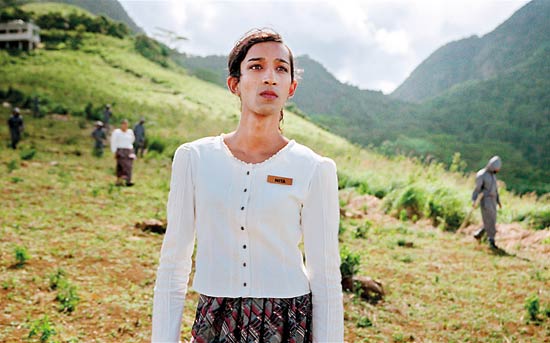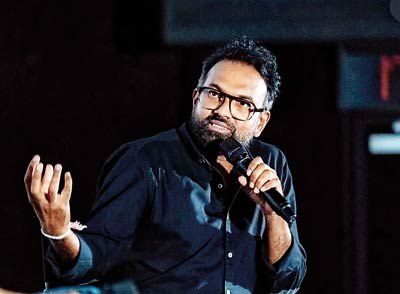From war stories to digital dystopia
For nearly two decades, Vimukthi Jayasundara’s lens has been trained on Sri Lanka’s most painful wounds—war, minorities, displacement, the human cost of conflict. His films became quiet testimonies to suffering, earning him the Camera d’Or at Cannes in 2005 for his debut “The Forsaken Land” when he was just 27 years old. But with “Spying Stars,” which premiered at the 30th Busan International Film Festival, the acclaimed director makes a dramatic pivot that feels both surprising and inevitable—his first feature in a decade.

From war narratives to sci-fi narrative: Stills from Spying Stars shot in Knuckles Mountain Range (above and below)
The pandemic’s gift:
A new kind of fear
When COVID-19 hit, Jayasundara was writing different screenplays. The global lockdown forced a complete stop. But from that stillness came a revelation about humanity’s relationship with technology. “During the pandemic, you have to believe in device,” he notes. “You can’t meet people in person without technology. But now we do believe technology as like nature. The sun and the moon—technology is close to that.”
His sci-fi narrative follows Anandi as she visits Hanuman Island to perform last rites for her father in a dystopian future plagued by “Illvibe”—a pandemic caused by machine dominance. The personal and the apocalyptic collide when she’s quarantined, unable to grieve privately in an age of pervasive surveillance.
Science fiction from the inside out
What distinguishes “Spying Stars” from typical sci-fi blockbusters? Jayasundara’s determination to focus on human complexity amidst spectacle.
His solution? Build the science fiction from within the human experience. “I wanted to have this science fiction from within the relationship we have, the problems we have, the desires, nostalgia, whatever the human issues are. Science is inside of that.” The result is what he calls “a liberation film that is spiritual in nature,” asking one central question: “In a time of pervasive voyeurism and technological control, how do we retain our humanity?”

Vimukthi Jayasundara: Returns from a decade-long creative and spiritual hiatus
Sound as creation,
sound as weapon
Sound design became crucial to the film’s cosmology, encapsulating creation myths about vibration being the source of all matter—ideas present in string theory and quantum mechanics. Jayasundara collaborated with acclaimed French sound designer Roman Dymny (Green Border, Yakushima’s Illusion), experimenting with human and synthetic sounds at different frequencies. Alokananda Dasgupta (Jubilee, Sacred Games) composed the evocative soundtrack, layering the film’s sonic universe with both organic and artificial textures.
A Sri Lankan production renaissance
“Spying Stars” represents more than a personal artistic evolution—it showcases Sri Lanka’s growing technical capabilities. Produced by Vincent Wang’s Paris-based House On Fire and Indian producer Nila Madhab Panda’s Eleenora Images, with Michel Klein, Arfi Lamba and Katharina Suckale as co-producers, the film was shot in Sri Lanka’s breathtaking Knuckles Mountain Range. The cast features Hidaayath Hazeer, Saumya Liyanage and Samanalee Fonseka.
Significantly, the mysterious satellite and visual effects were created entirely by Sri Lankan animators. “We have a growing CG animation and VFX industry in Sri Lanka,” Jayasundara observes proudly, noting that the country is bouncing back from its post-pandemic financial crisis. The island nation is drawing renewed interest from international filmmakers—Apichatpong Weerasethakul is currently prepping his new feature there.
The Busan connection
Jayasundara’s relationship with Busan International Film Festival runs deep. Most of his films have been screened there, and he served as a mentor at the BIFF Asian Film Academy in 2016 under dean Tsai Ming-liang. He met both cinematographer Eeshit Narain and editor Saman Alvitigala through the academy—a testament to BIFF’s role in fostering lasting creative collaborations.
Return to Sri Lankan cinemas
Following a European festival premiere early next year, Jayasundara plans to release “Spying Stars” in Sri Lankan cinemas. He’s optimistic about local audiences, noting that young people are returning to theaters. The recent hit “Tentigo,” a raunchy comedy, proved there’s appetite for local content. Ironically, Sri Lanka’s financial crisis may have protected its cinema culture.
What comes next
Having returned from a decade-long creative and spiritual hiatus, Vimukthi Jayasundara enters what promises to be his most prolific phase. He’s abandoned the narratives of conflict that once defined him, yet his instinct for probing difficult truths remains razor-sharp. “Spying Stars” demonstrates his mastery—bending genre conventions to his vision without sacrificing the meditative, philosophical depth that distinguishes his voice.

Beyond cinema, Jayasundara is preparing a visual art exhibition in Colombo, extending his investigation of surveillance and technological consciousness into physical space. This signals an artist refusing singular classification, someone whose years away from filmmaking revealed new territories for creative exploration.
His dystopian vision isn’t speculative—it’s documentation. We inhabit it already, this world where devices anticipate our thoughts, where artificial intelligence governs our choices, where screens mediate every human exchange. We simply call it normal life. His central question demands reckoning: How do we preserve our humanity?
The boy who once asked bold questions now warns us about the machines we’ve welcomed into our lives. This time too, we should probably listen.
Searching for an ideal partner? Find your soul mate on Hitad.lk, Sri Lanka's favourite marriage proposals page. With Hitad.lk matrimonial advertisements you have access to thousands of ads from potential suitors who are looking for someone just like you.


